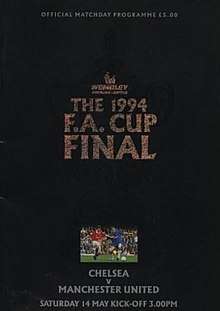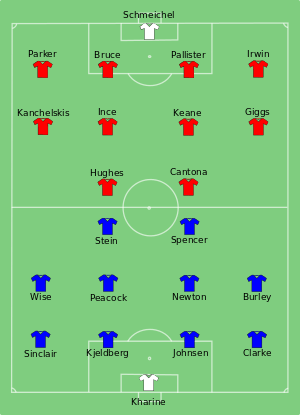1994 FA Cup Final
 The match programme cover | |||||||
| Event | 1993–94 FA Cup | ||||||
|---|---|---|---|---|---|---|---|
| |||||||
| Date | 14 May 1994 | ||||||
| Venue | Wembley Stadium, London | ||||||
| Referee | David Elleray (London) | ||||||
| Attendance | 79,634 | ||||||
| Weather | Rain | ||||||
The 1994 FA Cup Final was the 49th FA Cup final to be held since the Second World War and was contested between Manchester United and Chelsea. United went into the final as Premier League champions, having won the title by eight points over Blackburn Rovers. They were bidding to become only the fourth team of the 20th century to complete "the Double" and the first in their own history. Chelsea, on the other hand, were playing in their first FA Cup Final since 1970 and first major final since the 1972 Football League Cup Final; they also finished 14th in the Premier League.
Summary
The match took place on a rainy May afternoon, and, in the first half, Chelsea were the better team. Gavin Peacock had the best chance of the opening 45 minutes when his half-volley hit the crossbar. In the second half, Manchester United took over with three goals in the space of nine minutes; two almost identical penalties by Eric Cantona and a shot by Mark Hughes, following a slip by Chelsea defender Frank Sinclair. Brian McClair scored a late fourth following an unselfish pass by Paul Ince. Referee David Elleray has since stated that he regrets giving the second penalty to Manchester United, stating "It was my big game and I made a disappointing decision."[1]
This triumph was Manchester United's eighth success in the competition, matching the record set by Tottenham Hotspur three years earlier. Chelsea, despite losing their first FA Cup final since they won the trophy 24 years earlier, qualified for the 1994–95 UEFA Cup Winners' Cup as United had also won the Premier League title and would be competing in the UEFA Champions League.
It was the third time that Mark Hughes (a member of the 1985 and 1990 FA Cup winning sides) had collected an FA Cup winner's medal. However, his teammate Bryan Robson was not included in the squad for the final and missed out on the chance of collecting his fourth winner's medal. Hughes won a fourth FA Cup winner's medal three years later with Chelsea.
Road to Wembley
Home teams listed first.
Chelsea
Round 4: Chelsea 1–1 Sheffield Wednesday
Round 5: Oxford United 1–2 Chelsea Round 6: Chelsea 1–0 Wolverhampton Wanderers Semi-final: Chelsea 2–0 Luton Town |
Manchester UnitedRound 3: Sheffield United 0–1 Manchester United Round 4: Norwich City 0–2 Manchester United Round 5: Wimbledon 0–3 Manchester United Round 6: Manchester United 3–1 Charlton Athletic Semi-final: Oldham Athletic 1–1 Manchester United
|
Match details
Chelsea
|
Manchester United
|
|
 |
| |||||||||||||||||||||||||||||||||||||||||||||||||||||||||||||||||||||||||||||||||||||||||||||||||||||||||||||||||||||||||||||||||
|
Match rules
|
References
- ↑ "Sporting Spotlight: David Elleray". BBC Sport. British Broadcasting Corporation. 27 March 2013. Retrieved 27 March 2013.
External links
- Game facts at soccerbase.com